Submit a one to two-page essay describing a significant experience that has influenced your life. Discuss how this experience shapes your thinking about yourself as an educator. Be specific and descriptive.
Can you remember not being able to read? Try to imagine the feeling of looking at printed black figures – lines and curves and dots – and not being able to make heads or tails of them. In Paris, I could look at a street sign and read the word “rue” and figure out that it meant street, but here I was in Japan with all my belongings in two giant suitcases, a three year contract ahead of me, and I was completely illiterate.
I had just earned my Master’s of Teaching English to Speakers of Other Languages degree at St. Mike’s and had been hired to teach English at Kanazawa Institute of Technology in Kanazawa, Japan. I was picked up at the airport by the wife of my boss and deposited at a hotel where I would stay until an apartment was found. I was picked up at the hotel early the next morning by Omi-san, an older whisper-thin woman, with impeccable Japanese manners, whose smallness betrayed her strong personality. She and a young, bubbly, female real estate agent drove me around the suburbs of Kanazawa to show me different apartments. I had no idea where I was. When the apartment I liked the best was deemed too far from the school, I had no idea what too far really meant.
Each day at the end of the apartment searching, I was dropped off back at the hotel, always with a bag of food – usually some fruit and bread. I was truly thankful for all the help, but back at the hotel my isolation was highlighted. I grabbed a map from the hotel lobby my second day there and brought it upstairs to my room determined to go out and explore.
At 29, I felt like a seasoned traveler. I backpacked around Europe the summer I turned 18; spent a summer in Madrid studying Spanish; drove across the US with four friends; spent a week in San Francisco by myself because my travel partner fell through; drove through the Florida Keys alone because I wanted to; moved to Vermont only knowing one person. A New York City girl, I was unfamiliar with feeling intimidated by a city. I opened the map. It was completely in Japanese characters. Not a speck of Romanji (Japanese in roman letters). I couldn’t read it. I couldn’t even figure out where I was. Where was the red arrow saying, “You are here”? Where was the hotel on this map? Where was the downtown? Where were these prospective apartments? Where was the school in which I would soon be teaching?
I was illiterate. It was disorienting, scary. Sure, I was thankful for the help of Omi-san and the real estate agent; I was completely dependent on them! Omi-san spoke some English. Her husband had worked for years at a University in Toronto and remembering the kindness of strangers there she had dedicated herself to paying it forward once she returned to Japan. Communicating with her wasn’t a problem. I liked the pretty real estate agent; I thought we could be friends; except she spoke no English, and my Japanese was severely limited. Facial expressions, body language, and smiles can only go so far.
I had pursued a Master’s in Teaching English to Speakers of Other Languages because I wanted to live abroad, not just visit for a week and return home, to live and become part of the community, to feel like a citizen of the world. I hadn’t expected to feel isolated and illiterate.
I quickly set myself to task to learn at least two of the three alphabets used in Japanese – Hiragana and Katakana. Both 46 characters each, I studied my flashcards daily. I remember quite clearly when I was able to actually read the billboard outside my window – Nonoichi Auto! Sure, it was just a billboard, but I could read! I could read (a little) Japanese! No smiles, no soft tone, just the words – I could read!
Fast forward ten plus years: I have taught in three different countries and have lived on four different continents. I know the feeling of isolation, of not being able to communicate, all too well. When I teach, I am not only teaching a language; I am teaching communication. I am helping my students break through the fog of isolation that comes with being unable to communicate. I share their desire to communicate, as well as their frustrations and setbacks. I am sharing a lifeline – language – with them. Humans can’t live in a vacuum. We strive to understand and to be understood.
In learning a new language we are trying on a new personality, whether we are doing so for pleasure or for necessity. It is a never-ending process full of momentous highs and deep valley lows. As an educator I strive to provide support, guidance, and a gentle push when needed as my students work through the fog.
I see the smiles of apprehension on my students the first day of class. They cling to any word I use in their mother tongue. They steal glances around the room at their classmates wondering if they are the only ones not understanding every word I say. I speak slowly. I repeat. I open my arms wide and use my hands. I smile. I write Welcome! on the board, knowing that being able to read even the simplest word, the simplest phrase, bestows confidence and understanding.












